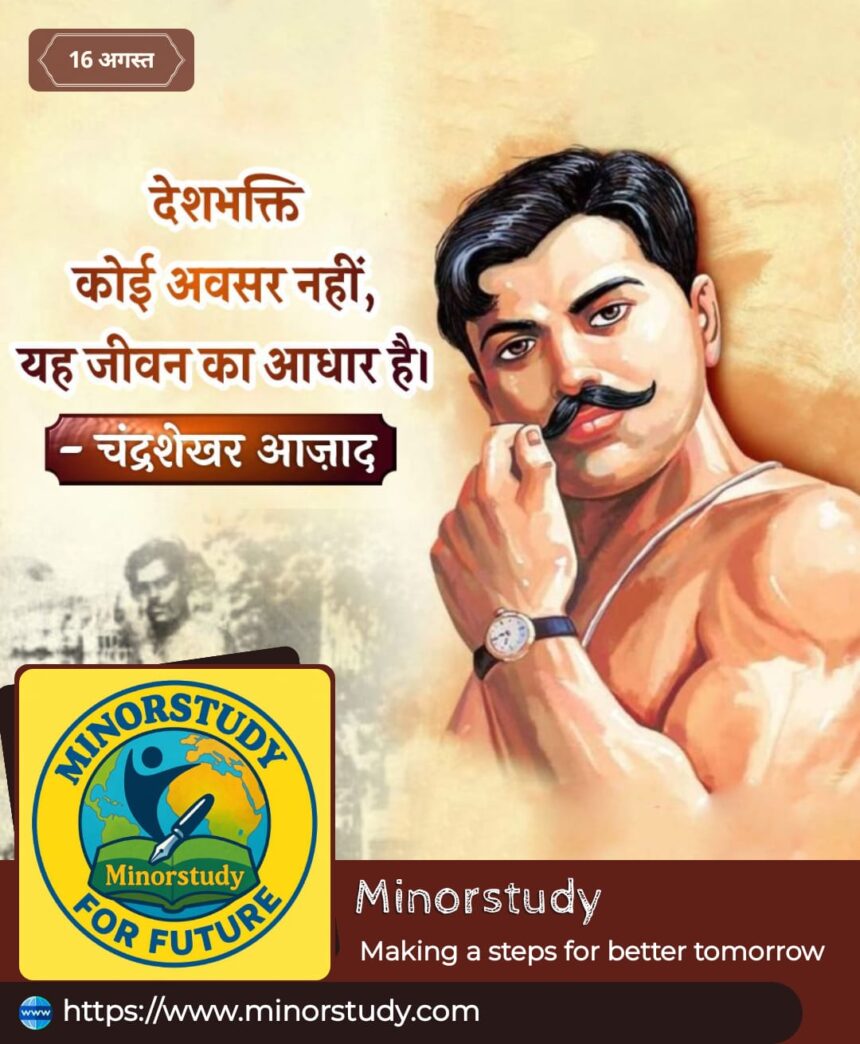5 Inspirational Lessons From Chandrashekhar Azad on True Patriotism
Chandrashekhar Azad, one of India’s most revered freedom fighters, believed that patriotism is not a fleeting celebration but the foundation of one’s life and actions. His words,
- History and Background of Chandrashekhar Azad
- Timeline of Chandrashekhar Azad’s Life
- Key Facts About Chandrashekhar Azad
- Significance of the Quote
- 5 Lessons From Chandrashekhar Azad’s Life
- 1. Patriotism is Action-Oriented
- 2. Selflessness Defines True Freedom Fighters
- 3. Youth Can Change the World
- 4. Courage Must Be Coupled With Strategy
- 5. Patriotism Guides Everyday Decisions
- FAQs About Chandrashekhar Azad
- Daily Life Lessons From Chandrashekhar Azad
- Societal and Cultural Impact
- Wishing and Celebrating Chandrashekhar Azad
- Important Points to Remember
- Conclusion: Chandrashekhar Azad’s Enduring Legacy
“Patriotism is not an occasion, it is the basis of life,”
reflect the depth of his commitment to India’s independence, justice, and the empowerment of the oppressed. Azad’s life continues to inspire citizens, youth, and leaders to embrace courage, selflessness, and ethical action in their daily lives.
This article delves into Chandrashekhar Azad’s history, key facts, timeline, the meaning of his quote, FAQs, societal significance, daily life lessons, and reflections, written in a human-friendly tone.
History and Background of Chandrashekhar Azad
Chandrashekhar Azad was born on 23 July 1906 in Bhavra, Madhya Pradesh. From a young age, he demonstrated courage, intelligence, and a deep sense of justice. Witnessing the oppression of the British colonial regime, he joined the Indian independence movement and vowed to dedicate his life to India’s freedom.
He became a key leader of the Hindustan Socialist Republican Association (HSRA), where he worked alongside other revolutionaries like Bhagat Singh and Rajguru. Azad’s philosophy emphasized that patriotism is an everyday responsibility, not limited to ceremonial occasions.
Timeline of Chandrashekhar Azad’s Life
1906: Born in Bhavra, Madhya Pradesh.
1921: Participated in the Non-Cooperation Movement led by Mahatma Gandhi.
1924: Joined revolutionary activities and adopted the pseudonym “Azad,” meaning “free”, symbolizing his commitment to independence.
1925–1931: Became a key figure in revolutionary attacks against the British, including armed confrontations and strategic protests.
27 February 1931: Died in a shootout with the British police in Alfred Park, Allahabad, declaring “Azad” as a mark of ultimate freedom.
Key Facts About Chandrashekhar Azad
Azad was known for his courage, intelligence, and leadership in the Indian revolutionary movement.
He adopted the name “Azad” to signify absolute freedom and resistance.
He believed that freedom requires continuous effort, ethical action, and personal sacrifice.
Azad inspired countless youth to actively participate in the freedom struggle.
His life is celebrated for its values of patriotism, courage, and selflessness, influencing India’s independence narrative.
Significance of the Quote
“Patriotism is not an occasion, it is the basis of life.”
This quote emphasizes several important aspects:
Consistency in Dedication: Patriotism is a lifelong commitment, not limited to holidays, festivals, or ceremonies.
Ethical Responsibility: True love for one’s country involves justice, service, and selflessness in daily life.
Courage and Sacrifice: Freedom requires personal risk, courage, and moral commitment.
Societal Awareness: Every citizen plays a role in uplifting, protecting, and strengthening the nation.
Timeless Inspiration: The quote reminds modern generations that patriotism should guide actions and choices every day.
5 Lessons From Chandrashekhar Azad’s Life
1. Patriotism is Action-Oriented
Azad believed that love for the nation is demonstrated through courageous and ethical action, not mere words or ceremonial gestures.
2. Selflessness Defines True Freedom Fighters
He gave up his personal comfort and safety, showing that selflessness and sacrifice are core elements of patriotism.
3. Youth Can Change the World
Chandrashekhar Azad inspired young people to take active responsibility for social and national causes.
4. Courage Must Be Coupled With Strategy
Azad’s revolutionary efforts were carefully planned and executed, showing that strength and intelligence must work together for impactful results.
5. Patriotism Guides Everyday Decisions
He taught that every decision, big or small, should reflect love, respect, and service for one’s country, making patriotism a basis of life, not just an event.
FAQs About Chandrashekhar Azad
Q1: Who was Chandrashekhar Azad?
A: He was a revolutionary freedom fighter, known for his courage, strategic thinking, and selfless commitment to India’s independence.
Q2: What does this quote mean?
A: It highlights that patriotism is a daily responsibility, not limited to national holidays or symbolic acts.
Q3: Why is Azad important in Indian history?
A: He inspired youth, promoted ethical revolutionary action, and significantly contributed to India’s fight against British colonial rule.
Q4: How did he demonstrate patriotism?
A: Through revolutionary activism, strategic planning, and fearless dedication, even at the cost of his life.
Q5: What can modern readers learn?
A: Courage, selflessness, ethical action, youth empowerment, and daily commitment to national welfare are timeless lessons.
Daily Life Lessons From Chandrashekhar Azad
Live Patriotically Every Day: Make decisions and act in ways that contribute to the betterment of society and nation.
Prioritize Justice and Ethics: True patriotism includes protecting the rights and welfare of fellow citizens.
Demonstrate Courage: Stand against injustice, oppression, or wrongdoing, reflecting ethical bravery in daily life.
Lead by Example: Inspire others by living the principles of dedication, service, and integrity.
Empower Others: Share knowledge, resources, and encouragement to uplift your community and country.
Sacrifice for Greater Good: Sometimes, personal comfort may need to be set aside for the larger welfare of society.
Inspire Future Generations: Teach youth that patriotism is a lifelong commitment, shaping responsible citizens.
Societal and Cultural Impact
Chandrashekhar Azad’s life emphasizes continuous commitment to freedom and justice.
He became a symbol of youth courage and ethical patriotism, motivating generations to act for society.
Commemorative events, schools, literature, and films honor his sacrificial life and ideals.
His philosophy encourages every citizen to integrate patriotism into daily conduct, strengthening the social and moral fabric of the nation.
Wishing and Celebrating Chandrashekhar Azad
“May Chandrashekhar Azad’s courage and dedication inspire you to live each day with patriotism, selflessness, and ethical responsibility.”
“Let his life remind us that patriotism is the foundation of action, thought, and service in all aspects of life.”
Azad Jayanti and related celebrations ensure that his values of courage, strategic action, and lifelong patriotism continue to inspire citizens across India.
Important Points to Remember
Patriotism is a daily responsibility, not a ceremonial act.
Courage, selflessness, and strategic action define true dedication to the nation.
Youth can bring revolutionary change and societal improvement when inspired by values like Azad’s.
Ethical action, justice, and service are the cornerstones of meaningful patriotism.
Chandrashekhar Azad’s life teaches that freedom and nation-building require continuous effort, moral integrity, and personal sacrifice.
Conclusion: Chandrashekhar Azad’s Enduring Legacy
Chandrashekhar Azad’s words and life remind us that patriotism is the foundation of daily living, not just an occasion for celebration. His quote,
“Patriotism is not an occasion, it is the basis of life,”
emphasizes that true love for the nation manifests through ethical action, courage, and consistent selfless service.
By following his example, individuals can make informed, ethical decisions, empower communities, and actively contribute to societal welfare, keeping the spirit of patriotism alive every day. Chandrashekhar Azad’s life continues to inspire courage, strategic thinking, and ethical action, ensuring that his legacy shapes generations of responsible, patriotic citizens.








